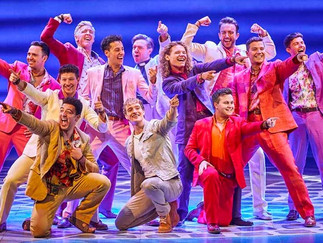Mamma Mia
- Jenny Daniel

- Feb 3, 2023
- 3 min read
Benny Andersson, Bjorn Ulvaeus, Catherine Johnson
Stage Entertainment, Richard East, Andrew Treagus, Judy Cramer,
Manchester Opera House
January 31- February 11; 2 hrs 35 mins
(also Opera House Blackpool, March 21-April 1; Leeds Grand, April 4-15; Scarborough Open Air Theatre, June 14-18)


Not the original jukebox musical, but surely the greatest of them, Mamma Mia explodes with joyous abandon on to the stage of Manchester Opera House this week. From the start it feels special.
Strangely traditionally, there is an overture and an instrumental Abba medley in front of a sea-blue curtain. These melodies, we understand immediately, will take centre stage.
But what a stage to take. The idyllic Greek island is painted for us in blue and white, with a simple set of walls and doors, immersive lighting and casual but immaculately-considered costuming. We open with an "I want" song, as Sophie (Jess Michelmore), our young bride-to-be, sings a reduced, prologue version of Have a Dream - shamelessly revisited at the end true to musical form, a self-referential nod to the story-explicit arc of so much musical theatre.
The musical premiered in 1999 and this is a show of the 90s, seen through the eyes of our main heroine, Sophie’s mother Donna (Sara Poyzer), the "mamma’" of the title, via the Abba songs of her youth in the 70s, when she was a girl-band singer with best friends Rosie (Nicky Swift) and Tanya (Sarah Eranshaw). The numbers are sometimes story-telling, sometimes reappropriated, sometimes joyful narrative performance pieces, as when the ageing trio don their white satin, flarey jumpsuits and give us Super Trouper (the uplifting story of jaded singers) for Sophie’s hen party. The spirit of Abba, never mentioned by name, is embedded visually as well audibly into the narrative.
The Mediterranean feel was itself already conjured by the music, with taverna honky-tonk piano and acoustic guitar so prominent. The music of these Scandinavian creators has long since pined for the sun; the setting of a fictional counterpart to Santorini seems the very place that much of this music might come to belong. And since Waterloo, Abba stood always for a kind of imaginary, Eurovisioned exoticism that also felt like home.
Herein lies Mamma Mia’s worst kept secret, that a jukebox show built on such theatrical, narrative-centred songs with iconic riffs, unforgettable melodies and lyrics that reference universal emotions in human relationships, has an almost infallible foundation. The creators – book writer Catherine Johnson and director Phyllida Lloyd – understand the songs integrally. How the brash, fanfare-like Take a Chance on Me (ably performed by Swift) is transformed, beginning as a faux-coy, semi-spoken invitation, building to a declamatory pursuit full of middle-aged female confidence, is not only comic and clever but raucous, heartwarming and exuberant, like so much of this show.
Alongside the very obvious bangers and heart-rending crowd-pleasers we hear from Donna (Mamma Mia, Dancing Queen, The Winner Takes It All), Chiquitita is a beautiful moment, a song transformed into a semi-narrative duet that Rosie and Tanya sing to comfort and entertain her out of her blues. Slipping Through my Fingers is staged to reflect Donna’s pain, and her centrality as a mother, as her daughter flies the nest. And Name of the Game is transformed from a love/break-up song to a plea from a daughter to a potential father to know their relationship. It could have been written for that very moment, rather than appropriated from the Abba canon.
Mention must also go to the innovative choreography of Anthony Van Laast, with arresting ensemble moments in Money Money Money, the dream sequence, Under Attack, and the iconic snorkels and flippers of Lay All Your Love on Me.
There is a rare alchemy to this show, in that it has dramatic integrity while acknowledging itself, to the audience, as musical theatre. It pinpoints the poignancy of women ageing joyfully, but not without regret. And it draws us head first into the stories and songs of universal human emotion, as told by Benny and Bjorn, and retold by Johnson and Lloyd for new generations.
If ever a show came close to giving its audience pure, unadulterated joy, this is the one.
More info and tickets here











